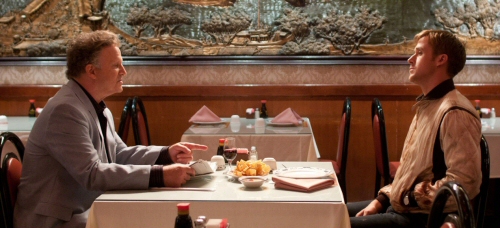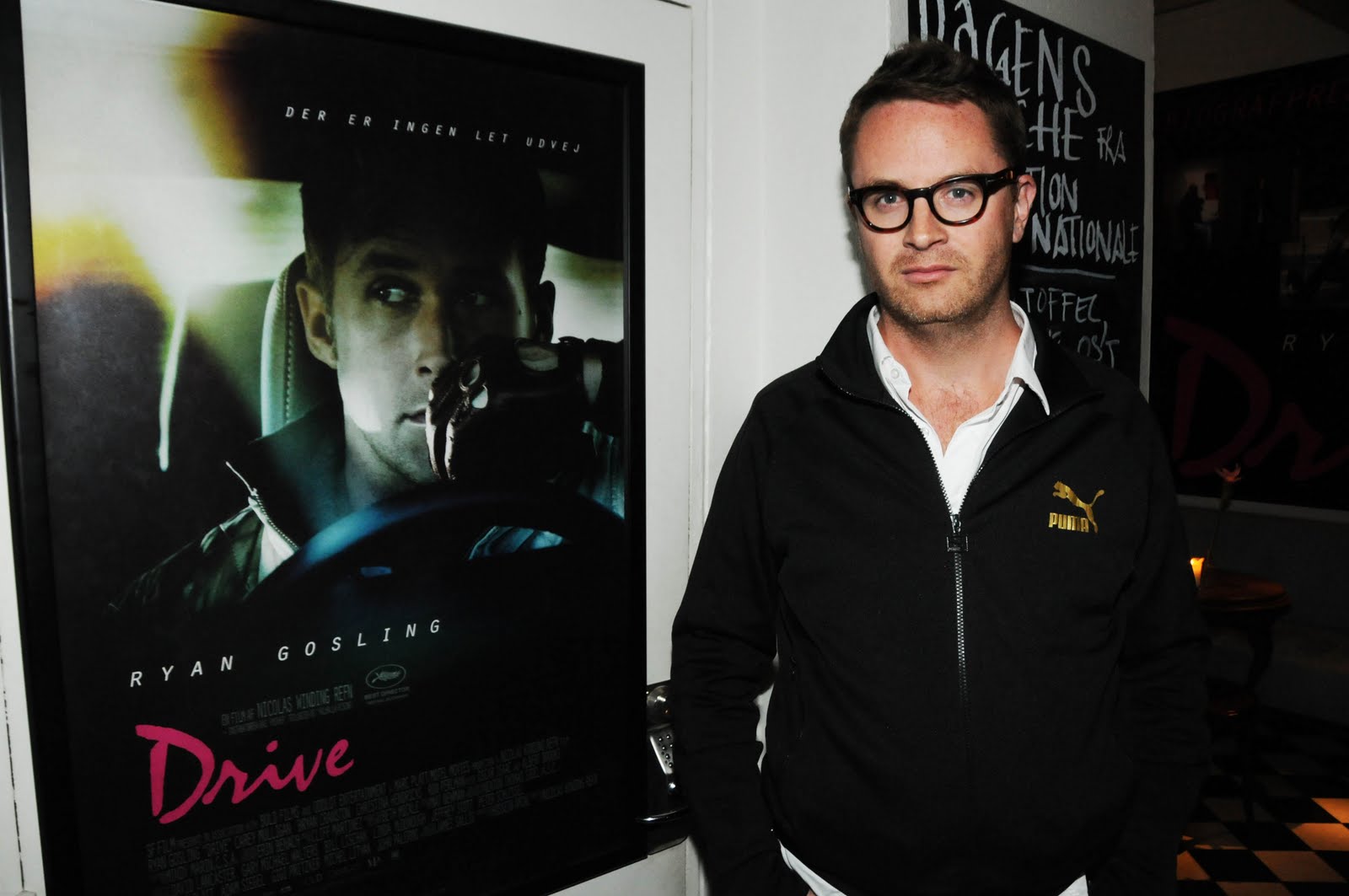Believe it. Drive is the best film to come along in a very long time. Not since Pulp Fiction has there been a more passionate love letter to the Cinema. Drive is one of my favorite movies of the sound era and it gives me hope... Cinema may not be completely dead after all.
Ryan Gosling stars as the Driver in yet another performance that has helped to cement him as one of Hollywood's top actors. Nicolas Winding Refn directs him with ease. With Drive, Refn has proven himself as one the premier directors of his generation. Drive, along with his previous films like Bronson and the Pusher trilogy, is not necessarily a reinvention of modern cinema, but more or less a reinterpretation of the days of Cinema past. Refn is startlingly good, so good I get goosebumps just from watching his scenes take time and build up. Finally the likes of Scorsese and Cronenberg can take it easy, and Tarantino and the Coens can step aside to make way for the next great talent in film direction: Nicolas Winding Refn.
Drive takes its lead from, quite possibly, the coolest film ever made. Jean-Pierre Melville's 1967 magnum opus Le Samourai.
Refn's creation, the character of the Driver, is cut from the same cloth as Le Samourai's Jef Costello. The characters share several likenesses, the least important of which being a mysterious and sordid past. The most important likeness being the almost ritualistic way both characters carry out the tasks assigned to them, the lonely lives in which they traverse through a disconnected and oblivious habitat, the trust that doesn't come easy but when it does it is given to a pretty girl who seals both of their fates, and most interestingly, the eyes. Ryan Gosling must have studied Alain Delon's performance as they both seem to communicate most of the plot-points with their eyes and only their eyes. The Driver's real name could easily have been Jef Costello as far as I'm concerned. This is also telling of how many different ways the same film can be so influential to extremely different ends. This polarity is best explored by the movies Drive and John Woo's 1989 The Killer. Both films are flamboyantly open about the debt each owes to the influence of Le Samourai. Where Drive is almost an arthouse action film, the Killer is the exact opposite of that. But influence on either film is unmistakable, Le Samourai wrote the book, and Refn has memorized each and every passage. Yes, it doesn't just stop with Gosling's performance, Drive owes a great deal to Le Samourai in almost every single department. The pacing Refn embraces is classic Melville, the way he tells the story is almost formulaic of a Melville crime picture. Drive, in essence, is an American action film with 60s French sensibilities. People may seem to give Drive too much credit in the originality department, where much of the credit is Melville-deserved. But I don't hold anything against Drive for being almost a reinterpretation Le Samourai. I see Drive for what it was always meant to be, the warmest and most sincere thank you letter to classic Cinema ever filmed. Refn does no hiding when it comes to the Melville influence, its there staring you right in the face. Bravo, Drive, Bravo! Melville would be proud.
What is most unique about Drive is the fact that the film is just as much a salute to the French New Wave of the sixties as it is a reimagining of the mainstream American cinema of the eighties. Surprisingly enough, in a film that boasts a very large and formidable Arthouse following, 1986's Cobra, 1985's To Live And Die In L.A., and several other nods to 80s cinema is almost interchangeable with the 60s influence. Where the 60s influence may be much more subtle and much more consistent throughout, the 80s influence is mostly on the surface. The 80s influence in Drive is of the strictly superficial variety, which is both faithful and respectful of the 80s films and techniques certain areas of the film are modeled after. Neon pink title card, synthesizer soundtrack, mood changes, the poster art, and the occasional trademark 80s lighting. Although a caricature like Marion 'Cobra' Cobretti can in fact be found on the surface of the character of the Driver, that is only the surface, it is not the actual substance of the character. The substance of the character is Le Samourai's Jef Costello. Its almost as if the movie's true colors are of the Melville variety, but it masquerades itself as something much more accessible. Drive pretends to be an 80s American action film. But Drive is so much than that, as any semi-educated cinefile will tell you, Drive is film that wears several different masks. Its true identity is that of Melville. And I can't think of a better frame of mind than that.
Cast-wise, yes, Albert Brooks steals the show. The character Brooks plays is also one of the only non-french influences on the film. Bernie Ross is wholly American, and that is why he is such a vicious character. Bernie Ross is an 80s action villain, and he is pitted against a 60s character study. The clash is almost inevitable, but the mutual respect is the most rewarding aspect of their relationship. Same can be said about fans of the Arthouse and of the Mainstream. There is a mutual respect there, although all too often these sects of film fans and filmmakers will clash, they are nothing without the other. That said, in theory the rift between Bernie Ross and the Driver can be symbolic of several different things: Mainstream vs Arthouse, Excess vs Conservation, Action vs Meditation, European sensibilities vs American know-how, but most daringly it represents the Death Of Modern Cinema. All the greats are killing each other. Film cannot survive in a climate of servitude to the past. Mainstream wounds the Arthouse, the Arthouse fights back. Both the Mainstream and the Arthouse refuses to let go of their history, therefore they are doomed to tell the same stories over and over again, and cut the other's throat when necessary. The current state of filmmaking is in a very sad state of affairs as of late, Drive is a film that pits over-used caricatures, genres, and eras, popular of modern visual storytelling, against each other, until once everything is done, destroyed, and wounded. All you are the left with are the end credits, and the promise of a stripped down and re-imagined future in filmmaking.
Overall, Drive is a perfect film. If you haven't seen it, I recommend that you do so immediately. If you have seen it, I don't care if you liked it or not, WATCH IT AGAIN. This film is trying to communicate the world to you, open up and listen.
And be on the look out for the next Gosling-Refn team-up with Only God Forgives! My most highly anticipated movie event of 2013!
As
a huge fan of both Drive and Bronson, Only God Forgives sounds
incredible. All of the released stills are looking great, the plot
sounds insane, and Refn and Gosling just may be the new De Niro and
Scorsese. Don't quote me on that, but if they keep the quality
film-making up, who knows?






No comments:
Post a Comment